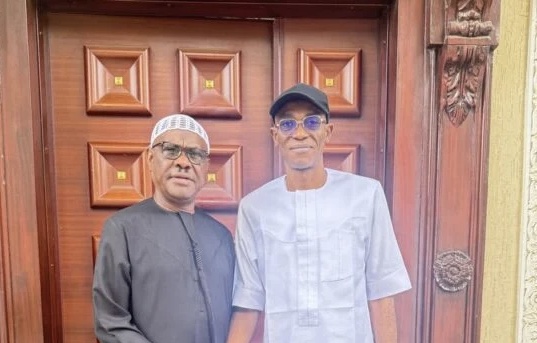The internal strife within the Labour Party has intensified with a faction loyal to Senator Nenadi Usman, the acting National Chairman, publicly condemning the suspended National Chairman, Julius Abure, for his perceived association with Nyesom Wike, the Minister of the Federal Capital Territory. This condemnation stems from a photograph depicting Abure and Wike together, an image that Usman’s faction interprets as definitive proof of Abure’s questionable allegiance to the party. The faction alleges that while key party figures like Peter Obi and Nenadi Usman are diligently working to advance the party’s interests and address critical national issues, Abure is engaging with individuals they consider detrimental to the Labour Party’s objectives. This action, they argue, reinforces their long-held suspicion that Abure is not only unsuitable for leadership but also actively working against the party’s best interests from within.
The Usman faction’s statement underscores the stark contrast they perceive between Abure’s actions and those of other party leaders. They highlight Peter Obi’s focus on national issues and Nenadi Usman’s attendance at high-level meetings abroad, both undertaken with the aim of furthering the Labour Party’s cause and serving the Nigerian people. Juxtaposing this with Abure’s alleged fraternization with Wike, whom they characterize as an adversary of their “New Nigeria vision,” the faction seeks to portray Abure as prioritizing personal gain over the collective good. They frame his association with Wike not as a casual encounter but as a deliberate alignment with forces they believe are actively working to undermine the Labour Party’s progress and its vision for a better Nigeria.
The accusations against Abure extend beyond his perceived association with Wike. The Usman faction also criticizes his alleged absence during crucial moments in the party’s development, times when they contend that strong leadership, unity, and strategic planning were paramount. They portray Abure as derelict in his duties, failing to provide the necessary guidance and direction when the party needed it most. This perceived lack of commitment, coupled with his alleged association with political opponents, forms the basis of their justification for his suspension. The faction essentially questions Abure’s true motivations, suggesting that his actions are driven by a personal agenda rather than a commitment to the Labour Party’s principles and goals.
The Usman faction further emphasizes the gravity of the situation by portraying Abure’s alleged actions as a betrayal of the party’s core mission. They argue that the Labour Party’s future is at stake and must not be compromised by individuals pursuing personal gain at the expense of the party and its vision for Nigeria. They present a stark choice: allowing the party to be steered by individuals they consider untrustworthy or ensuring its leadership remains in the hands of those committed to its ideals. This framing casts Abure’s alleged actions as a direct threat to the party’s very existence, highlighting the perceived urgency of addressing his alleged misconduct.
The statement concludes with a strong condemnation of Abure, characterizing him as a “crooked individual” who is jeopardizing the party’s future for personal gain. It contrasts his alleged actions with the sacrifices made by other members who are working towards a “better, fairer, and more just Nigeria.” This closing statement further emphasizes the Usman faction’s belief that Abure’s leadership poses a significant threat to the party’s values and objectives. It also serves as a rallying cry to other party members, urging them to stand against what they perceive as a betrayal of the party’s core principles.
In essence, the Usman-led faction’s statement seeks to paint Abure as a disloyal and self-serving individual who is actively harming the Labour Party from within. By contrasting his alleged actions with the dedication and sacrifices of other party members, particularly Peter Obi and Nenadi Usman, the faction aims to discredit Abure and justify his suspension. The public nature of this condemnation underscores the deep divisions within the Labour Party and suggests a power struggle for control of the party’s direction and future. The photograph with Wike serves as a catalyst for this public denouncement, providing a concrete example to support the faction’s pre-existing concerns about Abure’s loyalty and leadership.


